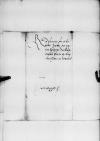List #2854
Samuel MACIEJOWSKI do Ioannes DANTISCUSCracow (Kraków), 1545-08-12
| odebrano Heilsberg (Lidzbark Warmiński), 1545-08-22 Rękopiśmienne podstawy źródłowe:
| ||||
Tekst + aparat krytyczny + komentarz Zwykły tekst Tekst + komentarz Tekst + aparat krytyczny
Reverendissimo in Christo Patri et Domino
Reverendissime in Christo Pater et Domine, frater et amice carissime et observande.
Salutem et obsequiorum commendationem.
Gratulor Vestrae Reverendissimae Dominationi tam Christianum animum, quod etiam inimicos in gratiam recipere sit parata illius exemplo, qui pro suis persecutoribus Deum exoravit. Quod autem his finibus praestare se velle scribit, quoad salva fide sua poterit, quam et Deo, et principi suo debet, hanc illius prudentiam non possum non vehementer probare, est enim Christiano episcopo cum primis digna.
Absit autem a me, ut ego aliud a Reverendissima Dominatione Vestra postulare velim, hoc peto, ut diligat homines, quo minus, si quibus insunt vitia, ea odio prosequatur, non impedio. Neque enim aliter diligere licet homines, quam si vitia eorum oderimus. Amare in illis oportet, quod a Deo creati sunt, odisse, quod ex perversa sua voluntate facti sunt. Quae tamen mutari possunt, sicubi suam Deus gratiam impartit, qui iustificat impium et ex persecutore facit apostolum. Quod autem significandum curaverit iis, de quibus scripseram, pergratum mihi fecit. Quid postea factum sit, scire velim. Quod vero tam amanter studium mihi suum defert in causa cum
Quas ad  BCz, 1599, p. 564 et illa cum
BCz, 1599, p. 564 et illa cum
Quoniam vero venit
Opto Reverendissimam Dominationem Vestram bene hidden by binding⌈[ne]ne hidden by binding⌉ valere. Cuius me fraterno amori commendo.
Dat(ae) or Dat(um)⌈Dat(ae)Dat(ae) or Dat(um)⌉
Vestrae Reverendissimae Paternitatis servitor
Postscript:
Si


